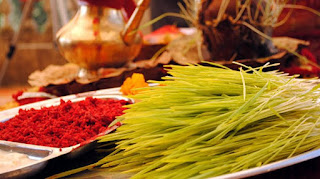The history of Nepal
has been influenced by its position in the Himalaya and its two neighbours,
modern day India and Tibet. It is a multiethnic, multiracial, multicultural,
multi religious, and multilingual country. The most spoken language of Nepal is
Nepali (नेपाली) followed by other various national
languages.
In Nepal there live
more than 125 nationalities. They have their own religion, culture and
celebrate different festivals and evern following different religions and
festivals. The people from various religions, ethnic groups and identities live
here with harmony. The various cultures, traditions, rites, and rituals are our
heritage. All the religions are equal.
DASHAIN
Among the different
festivals Dashain is celebrated by Hindus of Nepal or Nepalese origin all over
the World. Dashain, also known as Bada Dashain or Vijaya Dashami is the largest
and longest festival in Nepal.The Dashain festival lasts for full fifteen days,
starting in the day of Ghatasthapana (1st day), and ends in the day
of Kojagrat Purnima (15th day). The important ones being the first
(Ghatasthapana), seventh (Saptami), eighth (Maha Ashtami), ninth (maha nawami),
tenth (Vijaya Dashami) and the fifteenth (Kojagrat Purnima), the tenth day is
the most important among all, having the special value and actual meaning for
the word ‘Dashain’.
This festival is for
the celebration of the victory of the Gods over the wicked Demons. The
scriptures mention the example of lord Ram winning over Ravan and killing him,
and Goddess Durga winning over the demon Mahisasur.

Whatever the stories be, they symbolize the win of good over evil, and give the moral pressure for the people to be good, and that they will be destroyed in the same way as the demons, when they do or try to do the evil deeds. The first nine days of Dashain signify the rigorous battle between the avatars of Goddess Durga, and the Demons, the main of whom was the Mahisasur. The tenth day signify his destruction by killing, and the rest five days are for the celebration of that achievement.
v 1st
Day ( Ghatasthapana )
Ghatasthapana is the
first day of Bada Dashain. In this day,
a male family member plant the jamara in moist sand using barley seeds
especially corn seeds.
Traditionally as per
the rituals outsiders are not allowed to enter or see the place where it is
planted. By the tenth day of the festival, the seed will have grown to yellow
grass, which is used with tika to bless people with lots of prosperity and
happiness.
v 7th
Day ( Fulpati )
The special essence of
festival gets from this day. On this auspicious day, a military parade is
organized at Hanuman Dhoka.
The Nepal Army, Nepal
Police, Civil Service, Band Music and Panchebaja also join the fulpati parade.
People clean their houses and decorate their houses with flowers.
v 8th
Day ( Maha Ashtami )
The festive will be
continued as Maha Ashtami. Thousands of goats, sheep, buffaloes, ducks and hens
are sacrificed in Goddess Temple almost from every home.
v 9th
Day ( Maha Nawami )
The ninth day of the festival is known as Maha
Nawami. Once in a year this day, the Taleju Temple gates of basantapur are
opened for the general public.
Thousands of devotees
go and pay respect to the goddess all along the day.
v 10th
Day ( Tika / Vijaya Dashami)
The tenth day of
festival is known as Vijaya Dashami or “Tika”. On this auspisous day, tika and
jamara (which is sewn in the ghatasthapana) are taken from elders and blessing
is received including “Dakshin” (Money).
This function continues
for four days till the full moon during that period, family and relatives who
are apart attend to meet each other and take blessings from the elders.
This is the day that
helps to keep special bonding between families and relatives (Even Vijaya
Dashami is the great time for family reunion) so it is celebrated
intellectually in the society.
v 15th
Day (Kojagrata Purnima)
Kojagrata Purnima, the
full moon day, masks the ending of Dashain Festival. Literally, Kojagrata means
"who is awake".
On this day, Laxmi, the
goddess of wealth and luck, will come to earth and bless the people who didn't
sleep all night. Therefore, it has become an excuse for Nepalese people to
gamble overnight ;) .
Tourists can experience
Nepal religious culture and traditional customs by attending the various kinds
of celebrations, like Dashain flying kites, Dashain cards, etc.
Vijaya Dashami is a day
for celebration, a day for the victory of good over evil, This is a day when
the world see Vijaya Dashami is a day of the example of the power of good. Let
us continue the same true spirit forever and ever. Blessing of Dashain to all!!
Stay happy stay blessed. May goddess Durga give enough strength to cope up with
each and every difficulty times of ours.
Happy Vijaya Dashami (Dashain) to ALL !!































